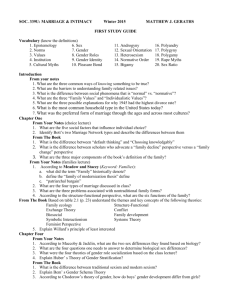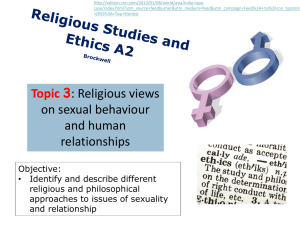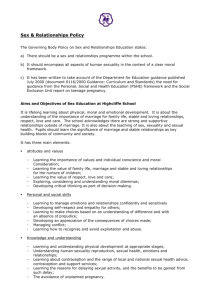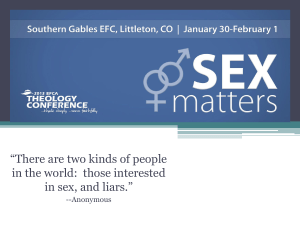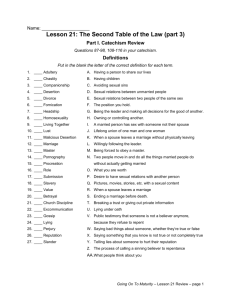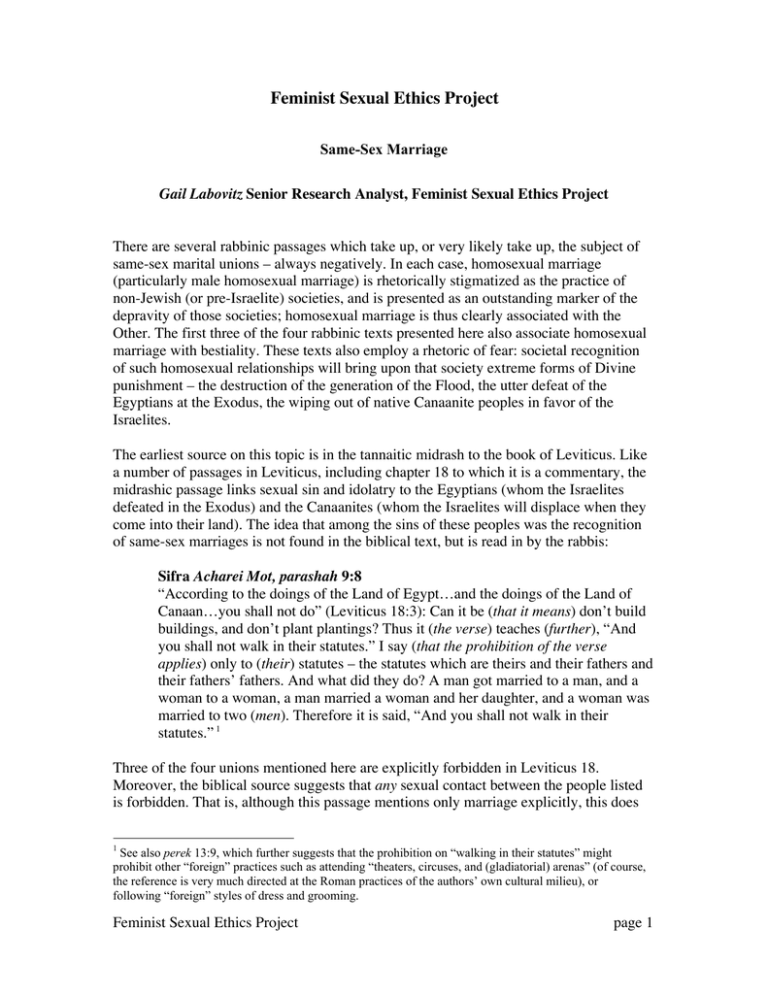
Feminist Sexual Ethics Project
Same-Sex Marriage
Gail Labovitz Senior Research Analyst, Feminist Sexual Ethics Project
There are several rabbinic passages which take up, or very likely take up, the subject of
same-sex marital unions – always negatively. In each case, homosexual marriage
(particularly male homosexual marriage) is rhetorically stigmatized as the practice of
non-Jewish (or pre-Israelite) societies, and is presented as an outstanding marker of the
depravity of those societies; homosexual marriage is thus clearly associated with the
Other. The first three of the four rabbinic texts presented here also associate homosexual
marriage with bestiality. These texts also employ a rhetoric of fear: societal recognition
of such homosexual relationships will bring upon that society extreme forms of Divine
punishment – the destruction of the generation of the Flood, the utter defeat of the
Egyptians at the Exodus, the wiping out of native Canaanite peoples in favor of the
Israelites.
The earliest source on this topic is in the tannaitic midrash to the book of Leviticus. Like
a number of passages in Leviticus, including chapter 18 to which it is a commentary, the
midrashic passage links sexual sin and idolatry to the Egyptians (whom the Israelites
defeated in the Exodus) and the Canaanites (whom the Israelites will displace when they
come into their land). The idea that among the sins of these peoples was the recognition
of same-sex marriages is not found in the biblical text, but is read in by the rabbis:
Sifra Acharei Mot, parashah 9:8
“According to the doings of the Land of Egypt…and the doings of the Land of
Canaan…you shall not do” (Leviticus 18:3): Can it be (that it means) don’t build
buildings, and don’t plant plantings? Thus it (the verse) teaches (further), “And
you shall not walk in their statutes.” I say (that the prohibition of the verse
applies) only to (their) statutes – the statutes which are theirs and their fathers and
their fathers’ fathers. And what did they do? A man got married to a man, and a
woman to a woman, a man married a woman and her daughter, and a woman was
married to two (men). Therefore it is said, “And you shall not walk in their
statutes.” 1
Three of the four unions mentioned here are explicitly forbidden in Leviticus 18.
Moreover, the biblical source suggests that any sexual contact between the people listed
is forbidden. That is, although this passage mentions only marriage explicitly, this does
1
See also perek 13:9, which further suggests that the prohibition on “walking in their statutes” might
prohibit other “foreign” practices such as attending “theaters, circuses, and (gladiatorial) arenas” (of course,
the reference is very much directed at the Roman practices of the authors’ own cultural milieu), or
following “foreign” styles of dress and grooming.
Feminist Sexual Ethics Project
page 1
not imply that sexual relationships between these persons outside of marriage is
condoned or overlooked. Also, this is the only source to mention women marrying
women as well as men marrying men.2 There is no explicit prohibition on female
homoeroticism in Scripture, but by linking marriage between two women with the other
forbidden sexual pairings here, the passage rhetorically implies that the prohibition/sin
involved is of a similar degree of authority and seriousness.3
Two parallel passages in amoraic midrashic (link to glossary) texts also link same-sex
marriage to the destruction of the society in which they take place; in this case, it is the
generation destroyed in the Flood who is “guilty” of this sin. One of the texts also
suggests associations to the strange biblical incident in which “sons of God” took
“daughters of men” for wives (Genesis 6:2), a verse which immediately precedes God’s
recognition of the wickedness of humanity and God’s determination to bring on the
Flood:
Genesis Rabbah 26:5
“And the sons of God saw the daughters of man, that they were fair, and took for
themselves wives, whomever they chose.” (Genesis 6:2)
“That they were fair”: Rabbi Yudan said, it is written “fair” (tovot), (what it
means/suggests is) one who was being adorned (“made fair,” “metivim otah”) for
her husband(-to-be; that is, for her wedding), the leader (literally, the great one)
would enter and have sex with her first. This is what is written: “fair” – these are
the virgins; “and took for themselves wives” – these are the married women (i.e.,
they took other men’s wives for themselves); “whomever they chose” – this is a
male or an animal.
Rabbi Huna in the name of Rabbi Yosef (said): The generation of the Flood was
not wiped out until they wrote gemumasi’ot for (the union of a man to) a male or
to an animal.
The statement of Rabbi Huna in the name of Rabbi Yosef is also cited in Leviticus
Rabbah, and like the Sifra passage just above, connects a mention of (male) homosexual
marriage to Leviticus 18:3:
Leviticus Rabbah 23:9
Rabbi Yishma’el taught: “According to the doings of the Land of Egypt…and the
doings of the Land of Canaan…you shall not do…I am the Lord, your God”
(Leviticus 18:3-4). And if not (that is, if Israel does not obey this commandment),
could it be possible (could God possibly mean to imply) that “I am not the Lord,
your God”?!
Rabbi Hiyyah taught: (The passage reads) “I am the Lord, your God” two times
(verses 2 and 4) – I am the One Who punished the generation of the Flood, and
the people of Sodom and Gemorah, and Egypt; and in the future I will punish
those who do as they did.
2
See also the discussion of this passage in the essay on female homoeroticism.
See Michael Satlow, Tasting the Dish: Rabbinic Rhetorics of Sexuality (Atlanta: Scholars Press, 1995)
189.
3
Feminist Sexual Ethics Project
page 2
The generation of the Flood were kings, and were only wiped off the earth
because they were soaked in sexual sin…
Rabbi Huna in the name of Rabbi Yosef (said): The generation of the Flood was
not wiped out until they wrote gemamasi’ot for (the union of a man to) a male or
to an animal.
The meaning of gemumasi’ot (or, as some textual variants of both midrashic works have
it, gumasi’ot; singular gemumasit/gumasit) is not clear, although it is generally taken to
be an adaptation of the Greek gamos. The author of a widely used dictionary to rabbinic
Hebrew, Marcus Jastrow, translates it as “coupling song,” and suggests that the term is
used “to deride the hymenean songs in their licentious application to sodomy and to
copulation with animals…”4 The authors/editors of the recognized critical/scholarly
editions of both Genesis and Leviticus Rabbah each suggest in their notes5 that the term
refers to marriage documents. In either case, the connection of this term with some sort of
wedding ritual is fairly certain.
Both passages deride sexual sin, and see these acts as worthy of Divine punishment. The
Genesis Rabbah passage links a variety of sexual sins/crimes: rape, adultery, male
homoeroticism, bestiality. Male homoeroticism is clearly stigmatized in this source. The
statement in the name of Rabbi Huna, citing Rabbi Yosef, in both sources, serves to
indicate that marriage between two men (or a person and an animal) is an especially
egregious violation. When human beings take their sinful behavior to this extreme,
extreme punishment – the Flood – is warranted.
Finally, the Babylonian Talmud once makes mention of the idea that non-Jewish societies
might sanction same-sex marriage, but treats the topic very differently from the other
sources above:
Babylonian Talmud Hullin 92a-b
“And I said to them, ‘If it is good in your eyes, give me my wage, and if not,
withhold it.’ And they weighed out for me my wage, thirty pieces of silver.”
(Zechariah 11:12) Rabbi Yehudah says: These (the pieces of silver) are (i.e.,
symbolize) the thirty righteous people of the nations of the world, such that the
nations of the world are sustained by them. Ulla said: These are the thirty
commandments which the children of Noah (a rabbinic term for non-Jews)
accepted upon themselves, but they only keep three (of them) – one, that they do
not write a marriage contract for males…
This last source stands out in that it depicts non-Jews as refraining from going so far as to
marry men to each other. Clearly, this act is so egregious that in the mind of the author of
4
Marcus Jastrow, A Dictionary of the Targumim, the Talmud Babli and Yerushalmi, and the Midrashic
Literature (reprint, New York: The Judaica Press, Inc. 1996) 252.
5
J. Theodor and Ch. Albeck, Midrash Bereshit Rabba: Critical Edition with Notes and Commentary
(Jerusalem: Wahrmann Books 1965) 248 (note to line 6); Mordecai Margulies, Midrash Wayyikra Rabbah:
A Critical Edition Based on Manuscripts and Genizah Fragments with Variants and Notes (Jerusalem: The
American Academy for Jewish Research 1960) 539 (notes to line 4).
Feminist Sexual Ethics Project
page 3
this passage even the sinful Others outside of Israel – who are otherwise portrayed as
unable to observe most of the basic guidelines for proper human behavior – do not
commit this act.
What all of these sources suggest is that in the rabbinic mindset giving societal
recognition to same-sex marriage is among the most egregious violations that human
beings can commit. Only non-Israelites might be suspected of sanctioning such
relationships; there is no suggestion that Israelites would ever consider such a thing.
Indeed, Israelites are to avoid this in no small measure precisely because it is the
(imagined) practiced of the Other. Homosexual contact, especially between men, is
already highly stigmatized in rabbinic literature and is often associated with non-Jews
(see, as just one example, Sifra Acharei Mot, perek 13:86). Marriage between members of
the same gender, however, goes beyond forbidden sexual acts between individuals to the
level of societal approval of this sin. When sin is no longer recognized as sin by a society,
the rabbis would assert, that society loses its right to existence – like the generation of the
Flood, or the defeated Egyptians and Canaanites, such a society deserves to be swept
away.
http://www.brandeis.edu/projects/fse/
6
See the discussion in Satlow, Tasting the Dish 203-06. As Satlow also notes, male homosexual
intercourse is forbidden to all humanity, according to rabbinic literature. The prohibition is derived from
Gen. 2:24, “Hence a man leaves his father and his mother and clings to his wife…” Since the same Hebrew
word, isha, designates both “woman” and “wife,” the rabbis read “to his wife/woman, and not to a male, or
an animal.” See, for example, Genesis Rabbah 18:5, Palestinian Talmud Kiddushin 1:1 (58c), Babylonian
Talmud Sanhedrin 58a.
Feminist Sexual Ethics Project
page 4

